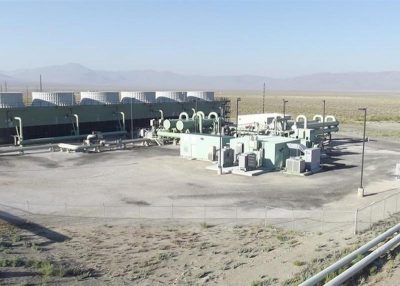New Senate American Power Act could be catalyst for clean tech sector in U.S.
A new US Senate energy and climate legislation, called the American Power Act, is being introduced by Senators John Kerry and Joe Lieberman.
A release by National Bank from Canada looks into a new US Senate bill that could be catalyst for Clean Tech Sector, but also asks if it will pass. This is an important piece of legislation and one that clearly effects all renewable energy development in the U.S. and last not but least also geothermal energy.
It writes, “After one false start, Senators John Kerry and Joe Lieberman introduced proposed energy and climate legislation on May 12, named the American Power Act. The proposal includes provisions that would be supportive of alternative fuels, energy efficiency, nuclear power and carbon capture, among other things. The Act does not consider a renewable portfolio standard as was anticipated. While the bill is potentially positive for the sector, there are still many hurdles before this bill is passed.
American Power Act targets energy security and carbon emissions
Senators Kerry and Lieberman have introduced a proposal for energy and climate legislation that targets energy independence, green house gas reduction and job creation. The Act targets heavy industry power generation and transportation, by tackling all major sources and uses of energy in the United States. To gain bipartisan support, the bill includes initiatives that could sway Republican support, including more aid for nuclear power and clean coal. Offshore oil drilling has become contentious, though the act has offered an “opt out” provision which would allow states to have some control over their neighbours’ activities. Will it pass? Senate Majority Leader Harry Mason Reid reportedly will review the energy legislation with energy committee chairmen after the Memorial Day recess at the end of this May and gauge sentiment at that time. If the legislation is seen to be too contentious, we could see a scaled-back proposal that includes some of the less controversial issues in the Act. In a busy and fractured Congress, the bill could find opposition.
GHG emissions could be regulated at the national level
The Act sets a target of 17% reduction in CO2 emissions by 2020, from 2005 levels and could be increased to 80% by 2050. With the introduction of GHG legislation, the Environmental Protection Agency (EPA) will not be able to regulate CO2 emissions – some industry groups were not keen on having the EPA as a regulator. State wide initiatives for carbon trading, like the Regional Greenhouse Gas Initiative, which has raised hundreds of millions for the north-eastern states, would be superseded by the new act. The act proposes a carbon market system to reduce emissions, but will implement a hard price collar for carbon prices (beginning at $12/ton in 2009 dollars), which rise at a fixed rate over inflation. It will likely take years for the price of carbon to become material, with a long lead-time for major emitters to reduce emissions (the cap would begin in 2013) and with generous allowances in the first few years.
Clean coal and Nuclear to get some funding so as to sway Republicans
A $2 billion per year incentive is included for research and development of carbon capture and sequestration technology to support the coal industry. Also, $54 billion in loan guarantees, like the ones seen in the American Recovery and Reinvestment Act last year, for the nuclear industry were added. Plus, liability protection for up to 12 plants could be added to sweeten the pot. These provisions could help sway some Republicans who are wary of the other measures in the bill.
Incentives for natural gas and electric vehicles
A goal of the bill is to reduce U.S. dependence on Middle East oil by 30-40% over the next 20 years. To get there, the U.S. will have to increase the fuel efficiency of vehicles and increase alternative fuel and electric vehicle usage. Incentives for the purchase of natural gas vehicles could be as high as $64,000 per vehicle, depending on cost, reducing payback periods by years. These provisions would be positive for companies like Westport Innovations (WPT-UP) and Clean Energy Fuels (CLNE-SP); however, we believe much of the potential is already reflected in these stocks. The bill, which also calls for electric drive refuelling infrastructure, industry standardization, and a Clean Vehicle Tech. Fund for R&D and manufacturing of electric and hybrid vehicles (EV/HEV), would benefit Azure Dynamics (AZD-OP), which has just introduced an all-electric vehicle co-branded with Ford (F-NR).
Renewable Portfolio Standard (RPS) not included, but not a big driver in our coverage
Independent Power Producers with U.S. aspirations might have benefited from RPS requirements, though most states already have similar provisions (many are more aggressive). The omission of the RPS might be a disappointment to some companies in our universe that might have benefited include: Algonquin Power (AQN-OP), Innergex Renewable Energy (INE-OP), and Pristine Power (PPX-OP). Pristine also has a focus on natural gas peaking generation – which would be needed to reduce coal consumption and to deal with the intermittent power provided by most renewable energy sources. U.S. RPS requirements could also have supported companies looking to export green power to the U.S., like Plutonic Power (PCC-SP). Given that 29 states (+D.C.) have formal RPS goals and another six have targets, the lack of a federal RPS is not a significant negative.
What could shoot this bill down?
There will likely be a number of contentious issues in the bill, including off shore oil drilling, revenue sharing agreements between the states for offshore oil and gas drilling, and limitations on the power of the States and the EPA to regulate emissions. With a Congress that remains divided after recent health care legislation and with a growing national deficit, the energy and climate bill may not pass in its initial form, if at all, before the August recess.”
Source: Rupert M. Merer and Jeremy Mersereau of National Bank Financial


















